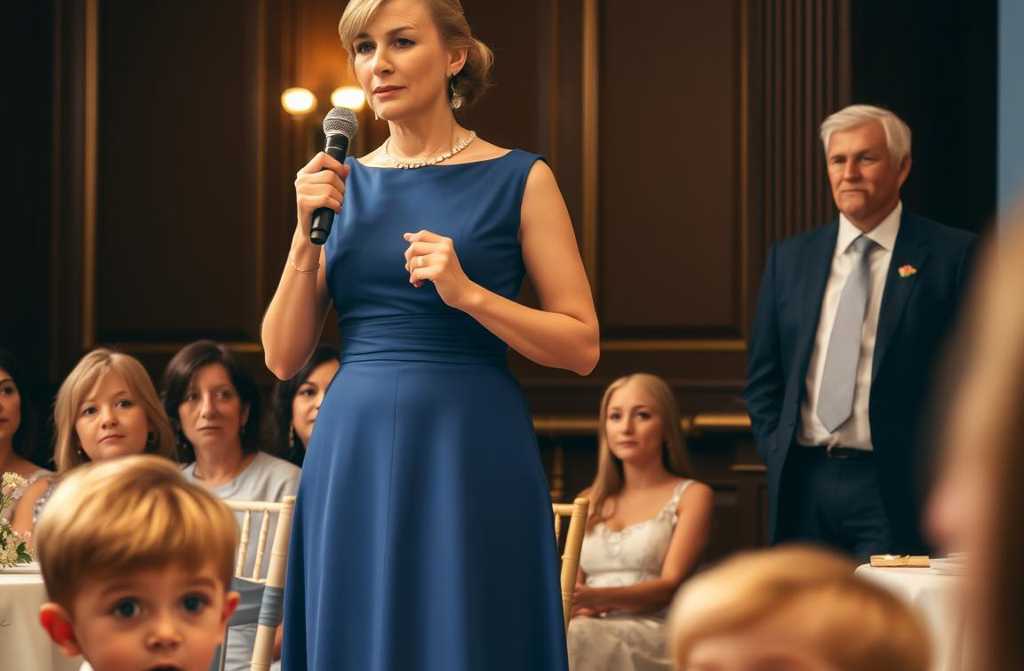**Diary Entry**
Ill never forget that wedding day. My own son, Thomas Whitmore, looked me dead in the eye and called me a disgracetold me to leave. But I took the microphone and spoke my piece.
Margaret Whitmore stood in the doorway, barely opening itjust enough to see without disturbing. She watched her son with a mothers pride, that quiet ache of love and something sacred. Tommy stood before the mirror in a sharp suit, his mates helping with his tie. He looked every bit the groompolished, handsome, at ease. But inside, Margarets chest tightened. She felt invisible, as if she didnt belong in this life, as if she hadnt been invited.
She smoothed the hem of her worn dress, imagining how it would pair with the blazer shed saved for the occasion. Shed already decided to go, invitation or not. But the moment she stepped forward, Tommy turned, his expression hardening. He shut the door behind him.
Mum, we need to talk, he said, firm but calm.
Her heart hammered.
Of course, love. II got those shoes, remember the ones? And
Mum, he cut in. I dont want you there tomorrow.
Margaret froze. The words didnt sink in at first, as if her mind refused to let the pain through.
Why? Her voice wavered.
Because its a wedding. Because people will be there. Because you look well, not quite right. And your jobMum, I dont want them thinking Im from some council estate.
His words stung like sleet. Margaret tried to interrupt.
I booked a hairdresser, a manicure Ive got a dress, simple but
Dont, he snapped. Dont make it worse. Youll stick out. Just stay away.
He left without waiting for a reply. Margaret stood alone in the dim flat, the silence thick as wool. Even her breath, even the ticking clockmuffled.
She sat motionless for hours. Then, as if pushed by some force, she rose, pulled an old shoebox from the wardrobe, and lifted out a photo album. It smelled of yellowed glue and forgotten days.
The first page held a faded picture: a girl in a hand-me-down dress beside a woman clutching a bottle. Margaret remembered that dayher mother shouting at the photographer, at her, at strangers. A month later, social services took her away.
Page after page hit like blows. A school photo: children in uniform, unsmiling. A stern matron. Thats when she learned what it meant to be unwanted. They beat her, starved her, but she never cried. Only the weak cried. And the weak werent spared.
Next, her teens. After school, she worked as a barmaid in a dodgy pub. Hard, but not frightening. For the first time, she had freedomand it thrilled her. She learned to sew, curled her hair with pins, practised walking in heels at night just to feel pretty.
Thenthe accident. A rowdy crowd, a spilled pint. The manager roared. She stammered an apology, but no one listened. Then Jamestall, calm, in a crisp white shirtsmiled.
Its just lager. Let her be.
No one had ever defended her. Her hands shook as she took his keys.
The next day, he brought flowers. Fancy a coffee? No strings. His smile made her feel like a woman, not that orphan girl.
They sat on a park bench, drinking from paper cups. He talked of books, travel. She spoke of the childrens home, dreams of a family. When he took her hand, her world shifted. His touch held more tenderness than shed known in her life.
That summer was golden. Picnics by the Thames, long walks in Epping Forest, whispered conversations in cafés. James introduced her to his friendsclever, polished, university types. She felt out of place, but he squeezed her hand under the table, and she found her courage.
They watched sunsets from a rooftop, wrapped in a blanket, sharing tea from a flask. James spoke of working abroad but swore hed never leave England for good. She memorised every word, knowing how fragile happiness was.
One night, half-joking, he asked how shed feel about a wedding. She laughed, cheeks burning, but inside she screamed yes. She didnt dare say it alouddidnt want to jinx the dream.
But the dream shattered anyway.
They were in the pub when it started. Laughter, then a slapa cocktail splashed in her face. James leapt up, but too late.
At the next table sat his cousin, sneering.
This is her? Your future wife? A barmaid from a home? Is this what you call love?
Patrons stared. Someone snickered. Margaret wiped her face and walked out.
The attacks followed. Anonymous calls: Disappear. Well ruin you. Neighbours spread liesthief, slag, addict. Only old Mr. Higgins refused to lie when offered cash to slander her.
Youre decent, he said. Theyre the rotten ones. Hold your head high.
She held on. Told James nothingdidnt want to wreck his internship in Paris. She waited, believing theyd survive.
But not all battles were hers to win.
Before he left, James father summoned her. Sir Richard Montgomery, a steel-eyed MP, glared across his desk.
Youre beneath him. Walk away, or Ill make sure you do.
She clenched her fists. He loves me.
Love? He scoffed. Loves for equals. Youre not.
She left with her chin up. Said nothing to James. Believed love would endure. But he flew off unaware.
A week later, the pub owner, Dave, accused her of stealing. The police came. The lawyer barely tried. The jury believed the witnesses. Sir Richard pulled strings. Verdict: three years.
The cell door clanged shut. Love, hope, futuregone.
Then the nausea. The test. Pregnant.
At first, she couldnt breathe. Then came resolve. Shed survive. For the baby.
Prison was hell. Jeers, jibes, but she stayed silent. At night, she whispered to her belly. Tommy. Thomas. A new life.
The birth was brutal, but the baby thrived. When she held him, she weptnot in despair, but hope.
Two inmates helped herrough but kind to the baby. They taught her to swaddle, to soothe. She endured.
Eighteen months later, parole. Mr. Higgins waited outside with a knitted blanket.
Come on, love. Fresh start.
Tommy slept in his pram, gripping a teddy.
She worked dawn to dusk: office cleaner, car wash, night shifts at a warehouse. Nights were for sewingaprons, curtains, anything to sell. Her body ached, but she pushed on.
One day, she ran into Lisa from the old pub.
Blimey, youre alive? Dave went bankrupt, you know. Lost the pub. And Sir Richards in Brussels now. James married some posh bird. Miserable, by all accounts.
Margaret nodded. Ta. Take care.
That night, after tucking Tommy in, she let the tears fall. Silent, private. By morning, she was back on her feet.
Tommy grew up wanting for nothing. New trainers, school trips, the latest gadgets. She sold her grans ring to buy him a tablet.
Mum, why dont you have a phone like normal people? he asked once.
Youre my priority, love, she smiled.
He never saw her exhaustion. She hid it well.
Then came the wedding talk. She hugged him, teary. Ill make you a proper shirt, alright?
He barely nodded.
Then the blow. Youre a cleaner. Youll embarrass me.
That night, she stared at a photo of toddler Tommy in blue dungarees, grinning, arms outstretched.
I gave you everything, she whispered. Maybe its time I lived for me.
She counted her savingsenough for a dress, a salon visit. She booked an appointment, chose subtle makeup, a sleek updo. Bought a navy dresssimple, elegant.
On the day, she studied her reflection. Not the tired cleaner, but a woman with a story. She even wore lipstickfirst time in years.
Tommy, she murmured, today, youll see who I was.
At the registry office, heads turned. Women eyed her, men glanced twice. She walked tall, smiling softly. No bitterness, no fear.
Tommy paled when he saw her. He hissed, I told you not to come!
She leaned in. I didnt come for you. I came for me. And Ive seen enough.
She smiled at Emily, his bride, who blushed but







